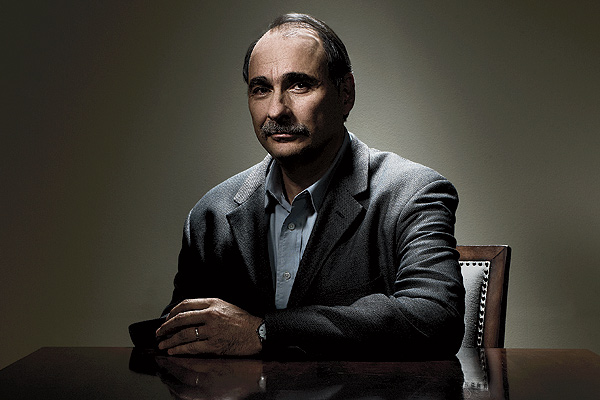
"I have one campaign left," says Axelrod, "and it is going to be to try to elect a guy who I think is a great president."
Related:
Q&A »
Axelrod on Chicago as the campaign HQ, what he misses about the West Wing, and more
HATCHET MAN: THE RISE OF DAVID AXELROD »
From the archives: our December 1987 profile
BARACK-ED! »
Chicago’s winners and losers in Election 2008
In early June, soon after another dismal jobs report stoked anxieties about the economy—the issue that will dominate the 2012 presidential campaign—the man tasked with masterminding Barack Obama’s reelection strategy, David Axelrod, sat in the conference room of his Chicago office, legs crossed, feet shod in waterproof sandals, a picture of serenity on the eve of electoral battle. As the chief strategist behind Obama’s heady 2008 presidential campaign and for two tumultuous years the president’s top adviser in the White House, Axelrod wasn’t the type to panic over a lousy economic report.
“One of the great things about having the experiences we’ve had,” he said, referring to Obama’s core of advisers, which has remained largely intact since 2007, “is we’ve been through so many ups and downs over the last four or five years that we don’t get intoxicated when things take a good turn, and we don’t get all flustered when we hit bumps in the road.”
In a year when some of those bumps are starting to look like hills—an economy stuck on sputter, high unemployment, sagging house prices and consumer confidence, soaring deficits and debt—Axelrod’s equanimity is sure to be tested. Within the president’s circle, he carries two unofficial job titles—keeper of the long view and keeper of the brand—that reflect his role in helping Team Obama stay on message and resist the temptation to change strategy in the heat of the moment. If Karl Rove was George W. Bush’s brain, as some observers have described him, Axelrod is more like Obama’s frontal lobe—the region that patterns emotion and regulates impulse control. And as the 2012 presidential campaign heats up, Axelrod’s counsel is as calming as it is simple: Be patient.
I first caught up with Axelrod in January of this year, as he was stepping down from his White House role as senior adviser to the president, and then met with him half a dozen more times in Chicago over the course of the winter and spring, while he recovered from the crucible of the White House and geared up for what may be his last race as a political strategist. “I have one campaign left,” he told me a week before he left Washington, “and it is going to be to try to elect a guy who I think is a great president.”
Photograph: Jeff Sciortino
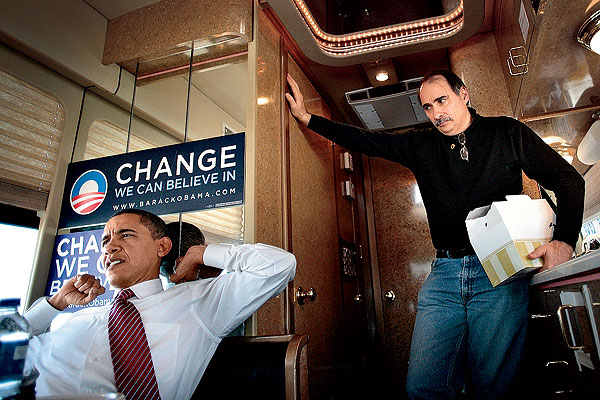
Axelrod with Obama on the campaign trail in 2008
Related:
Q&A »
Axelrod on Chicago as the campaign HQ, what he misses about the West Wing, and more
HATCHET MAN: THE RISE OF DAVID AXELROD »
From the archives: our December 1987 profile
BARACK-ED! »
Chicago’s winners and losers in Election 2008
Axelrod has always excelled at helping candidates connect with voters through their personal stories, something he did to perfection in 2008, when the insurgent Obama inspired hope and promised change—and entered the White House with approval ratings so high there was perhaps only one way they could go.
“When you have a transcendent campaign and candidate—where he became this Rorschach test for people who projected on him their own hopes, aspirations, issues, and expectations—by the president’s own admission he knew he was going to be a disappointment,” says Eric Adelstein, a Chicago Democratic strategist who has crossed paths with Axelrod over the years. “It would have been nice if this were just a movie and it faded to black after he gave his acceptance speech.”
While the president’s curriculum vitae grew fat—most notably with a $787 billion stimulus bill and health care and financial reform legislation—his poll numbers steadily sank, leading to the Democrats’ “shellacking,” as Obama called it, in the November 2010 elections. Even the killing of Osama bin Laden this past May boosted approval of the president only briefly, after which his ratings dipped back below 50 percent. It wasn’t just tea partyers who were unhappy. Even some Obama supporters felt let down, at least in part because of the administration’s perceived inability to communicate effectively or harness Obama’s rhetorical gifts to win public support for his policies. “We used the president too much to do a lot of routine government announcements,” Axelrod acknowledges.
When Axelrod spoke in June at the Aspen Ideas Festival in Colorado, the moderator, Time political columnist Joe Klein, picked up on the theme of disappointment in the president, telling Axelrod onstage, “[People] know he is smart. They know that he is trying hard. They wonder why he hasn’t been more forceful, why he hasn’t cut through.”
It was essentially the same question that has been directed at Axelrod since last spring: How has such a verbally agile president gotten so bogged down in communicating his vision to the country? “I think what I’ve learned and what I want to continue to hone—in certain ways, it is something I have been thinking about since the midterm elections—is we really need to return to first principles,” Axelrod says. “Go back to the 2004 [Democratic National] Convention speech, and [Obama] was very eloquent about what it is that we’re after as Americans. And he’s working on how to tell that story in the midst of the [economic] storm here. We have two focuses: One is to recover from the recession, and the other is to restore the security of middle-class families. Explaining that—when we haven’t fully recovered from the recession and people are very much feeling that economic uncertainty in their own lives—is challenging. So I want to think more about how to make that case.”
Axelrod has good reason to weigh matters carefully. The coming election will be a referendum on Obama’s first term and will offer voters a choice between two starkly different governing philosophies. If Republicans retake the White House, their mission will be to repeal Obama’s health care reforms and kill the rest of the expansive Democratic agenda of the past few years. More specifically, the outcome will shape Axelrod’s legacy, especially after two bruising years in the White House dented his reputation as a master of messaging. Will he be remembered as the shrewd political strategist of 2008, who could do no wrong, or as the man who oversaw Barack Obama’s transformation from modern-day FDR, as he was portrayed early in his presidency, to a one-term Democratic president à la Jimmy Carter?
Photograph: Zbigniew Bzdak/Chicago Tribune
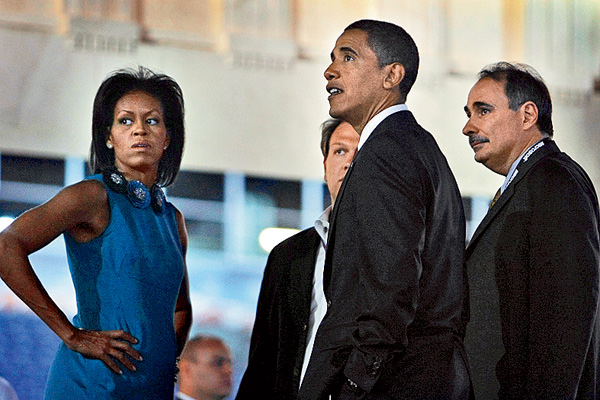
With the Obamas before Barack accepted the nomination for president
Related:
Q&A »
Axelrod on Chicago as the campaign HQ, what he misses about the West Wing, and more
HATCHET MAN: THE RISE OF DAVID AXELROD »
From the archives: our December 1987 profile
BARACK-ED! »
Chicago’s winners and losers in Election 2008
For some time, a caricature of Axelrod hung on a wall in his River North consulting office, AKPD Message and Media, depicting a gaggle of political operatives spinning a reporter at an Iowa bar, with Axelrod’s mustachioed mug the most recognizable among them. Axelrod, 56, has a look made for caricaturing, even more so as the years have passed and his hair has thinned to an unavailing comb-over. He tends to wear rumpled—and sometimes food-spattered—clothes and favors comfort over style in his footwear. Eric Lesser, the former White House staffer who served as Axelrod’s right-hand man during his two years in Washington, has occasionally regaled reporters with tales of Axelrod dribbling oatmeal on his ties, among other faux pas.
But by the spring of 2010, the caricature was starting to look like a realistic portrait. That March, a New York Times story depicted Axelrod as appearing droopy eyed and “more burdened than usual.” In it, the sportswriter Sam Smith, Axelrod’s old friend from their days working together as reporters at the Chicago Tribune, was quoted using the word “burnout” to describe his former colleague. According to Smith, an exasperated Axelrod called him after reading the article, asking, “Why did you tell The New York Times I was burned-out?” Smith said his quote was taken out of context, but the larger meme was already established.
“There is a conceit that grew, and it was predicated on the notion that we were a bunch of naive idealists that came to change Washington, and Washington beat us down,” Axelrod says. “I became symbolic of that. Now my guess is I look weathered, tired, and rumpled all the time, and I have for most of my life. It is just the way I look.”
Of course, Axelrod could have been forgiven for showing some wear, given that Obama took office in the midst of a financial crisis. Defenders of the administration blame the scale of the challenges Obama faced from day one for some of the problems in controlling the message. “They put aside the larger narrative framing as a priority and immediately started rolling up their sleeves,” says Chris Lehane, who served as press secretary for Al Gore’s presidential campaign and has worked with Axelrod in the past.
Axelrod sounds a similar note. “We were involved in a series of crises, many swirling around the economy, that made communications really, really challenging,” he says. “But in the process, the president spent a lot of time talking about details of government and not nearly enough time talking about the principles that animate him.”
By this line of thought, the unpopularity of Obamacare and the Democrats’ landslide loss last November of 63 seats in the House and 6 in the Senate were the result of poor PR rather than bad policy. “I think health care [reform] was a real shame, because the [legislative] sausage making became the story rather than the tens of millions who were going to be covered,” says Patti Solis Doyle, the Chicagoan who served as Hillary Clinton’s campaign manager in 2008. “They didn’t grasp how bad 2010 was going to be. The election results were a big wake-up call.”
Another strategist, who has known Axelrod for years, says the White House banked too hard on a “Field of Dreams mentality,” presuming that if “you build the successes, the public will come.”
Supporters say Axelrod got too much blame for the administration’s perceived mousiness. “I thought it was always unfair,” says Chicago’s mayor, Rahm Emanuel, who served alongside Axelrod as the White House chief of staff. “The key legislative items like health care reform or regulatory reform—these were big, intractable problems. These were very big pieces of legislation that are easy to malign if you want to be in the opposition. David doesn’t bear that responsibility by himself. He is also the person in the White House who helped pass [the legislation].”
As Democrats licked their wounds after the midterm elections, the administration was boosted by a series of late-year political successes—namely, the signing of a tax cut bill that proved even a chastened Obama could still move legislation. In January, the president delivered an emotional speech in Tucson after the shooting of Gabrielle Giffords, a Democratic congresswoman from Arizona, and followed it up with his generally well-received State of the Union address—Axelrod’s last big White House project. The speech was an effort to reframe Obama’s image with a phrase that is a potential campaign slogan for 2012: “winning the future.”
The slogan is important, says Axelrod, “because it implies that we have to do things, that we can’t just be flotsam on the historical waters and expect to arrive where we want to go, that there are things we have to [do to] secure the future for ourselves and our children.” Still, “winning the future” is, he says, “a more clinical phrase than is useful to tell the whole story.”
To figure out that story, Axelrod knew he needed to escape the Beltway and reacquaint himself with the world in which voters live. He needed to get back to Chicago.
Photograph: ALEX BRANDON / AP
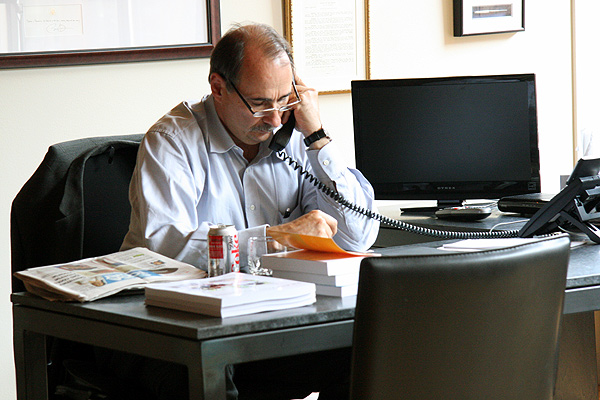
Axelrod at his River North office in July
Related:
Q&A »
Axelrod on Chicago as the campaign HQ, what he misses about the West Wing, and more
HATCHET MAN: THE RISE OF DAVID AXELROD »
From the archives: our December 1987 profile
BARACK-ED! »
Chicago’s winners and losers in Election 2008
Leaving Washington, says Axelrod, was like exiting a “whirling carousel.” And for symbolic purposes, he picked an appropriate time to return to Chicago: February 2, 2011, the day the city experienced one of its worst blizzards ever. “I want to spend time with people who don’t talk about Politico over dinner,” he said a few days later, over a bowl of matzo ball soup at Manny’s, the University Village deli where politicians like to congregate and where Axelrod is honored with his own table. “The conversation out here is so different. I was struck by [that on] the day when I got home. Cable TV was all about [the uprisings in] Egypt, and local TV was all about snow. It underscored [that] the reality of everyday life is different than the discussion in Washington.”
Over the next few months, Axelrod continued to decompress. He settled into his old office—he’s no longer a partner at AKPD, though he still rents space there—and lined up speaking engagements. He spent some time with his wife, Susan, at their Michigan cottage, vacationed for a week in Puerto Rico, took in several Bulls games, and rejoined his old pickup basketball crew at the West Loop Athletic Club. He read a little: Bill Simmons’s book on basketball, Thurston Clarke’s book on Kennedy’s 1961 inauguration, and, perhaps as a primer for the campaign ahead, Richard Hofstadter’s 1964 essay “The Paranoid Style in American Politics.”
“It was very interesting for me to observe the strategist’s mind as he recalibrated from being in the room on a day-to-day basis, inundated with so many of the decisions in government that matter a great deal but are not in the forefront of the [political] narrative,” says Larry Grisolano, Axelrod’s longtime partner and a top Obama campaign consultant.
While he reconnected with the real America, Axelrod was loath to make any formal declarations about the state of the electorate. “I think I have a sense of it, but I don’t think I have my arms around it,” he said in February. “I think it is very hard to get your arms around it in the White House. It is like working in a submarine, and you see the world through a periscope. You can see things, but it is not nearly as effective as walking out among the land people.” He maintained this agnosticism throughout the spring. By June, two months after the 2012 campaign had officially gotten under way, he said he was “far more relaxed,” having narrowed his focus to just the reelection. “I don’t have responsibilities for all these other events,” he said. “For me, the great advantage is I can step back. And this is what I always hoped, that there would be more clarity when I could step back and just focus on this.”
“Axelrod getting out of the White House will allow him to have the head space to re-sync with President Obama as he did in 2008, and by doing that, they’ll be able to get back to being an incredibly effective tag team,” says the Democratic strategist who has known Axelrod for years. “President Obama needs David to be grounded in his soul, in his Chicago soul. It is critical.”
* * *
Photograph: Esther Kang
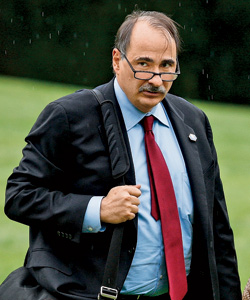
Axelrod at the White House as a senior adviserWhen he left Washington, Axelrod said he didn’t expect to be on the road much during the campaign, but by midsummer it appeared that notion had changed. “The truth is we should be on the road as much as we can,” says Jim Messina, Obama’s campaign manager. “The president said to both of us he wants us in states talking to people.” It’s an approach that suits the old newspaperman in Axelrod. “What I tried to do as a reporter,” he says, “I’ve tried always to do in my work in politics, which is not to presuppose that I know everything about the places in which I am working, but to know the right questions to ask. I am trying to approach this the same way. I am trying to ask the right questions so we can get the story.”
One key question on Axelrod’s mind is how to combat the tea party, a subject that has occupied him since his early days in the White House. A number of Obama advisers credit Axelrod with almost single-handedly holding the line early on against dismissing the tea party as a feckless and fringe right-wing movement. “Axelrod, from the very beginning, kept saying, ‘Be careful. This is more than just extremists. They are tapping into something very real,’” says Grisolano.
Related:
Q&A »
Axelrod on Chicago as the campaign HQ, what he misses about the West Wing, and more
HATCHET MAN: THE RISE OF DAVID AXELROD »
From the archives: our December 1987 profile
BARACK-ED! »
Chicago’s winners and losers in Election 2008
“Ax was one of the first people to really start raising on a regular basis in the White House the fact that this wasn’t just a grass-tops effort, that this represented a genuine frustration in the country,” says Anita Dunn, who served as the White House communications director in 2009.
Soon after departing Washington, Axelrod was beta-testing tea party counterplay, and by summer he was ratcheting it up. At the Cable Show, a television industry trade show in Chicago in June, he told an audience that the eventual Republican nominee would only be weakened by the “shrill voices” of conservative activists.
Of course, getting Obama reelected will involve more than just knocking down the opposition. It will require building up Obama and reselling him to voters who either haven’t bought into his policies or have lost faith in them. Obama’s advisers still think that the president’s personal story can be used in 2012. “It is not about building a character from scratch,” says Grisolano. “It is more about how the public interprets what they’re seeing now.”
Joel Benenson, Obama’s chief campaign pollster, adds, “I think the [2008] narrative was built largely around not just biography but personal characteristics. And the strength of the president in the first campaign and the reelection campaign [is that] those personal characteristics are extremely strong and have great resonance with average Americans.”
To win back disaffected centrist voters, the Obama campaign will remind them of his successes. “There are a lot of people who followed the deliberative process and the successful accomplishment of [the bin Laden] mission,” says Pete Giangreco, the campaign’s lead direct-mail consultant. “It is not just a story that he killed bin Laden. It’s the way he went through a tough decision and did the right thing. It says something about character. That is a thematic that works.”
It is also clear that the campaign will try to play the grownup card, portraying Obama as the reasonable adult above the fray. “I think most Americans and most independent voters and swing voters—most people—are looking for a level of reasonableness in their elected leaders,” says Jim Margolis, Obama’s campaign ad guru.
* * *
The standard practice for presidential campaign advisers is to depart the scene after the reelection. And whatever the outcome of the 2012 campaign, Axelrod, the driving force behind the election of the first African American president, can savor the laurels he has won. “I think he has already earned a place on the pedestal,” says Howard Wolfson, the spokesman for Hillary Clinton’s 2008 presidential campaign.
Axelrod has decided not to work on a memoir until after the 2012 election, but at some point after the dust has settled, it is likely that he will sit down and put his own story into words. He hasn’t felt the need to read any of the tomes about the 2008 presidential race or the first term of the Obama administration. “I lived it,” he says. “I also don’t want to bias my own thinking on that, just in case.”
Aside from writing, Axelrod is planning to head up a university-based political institution of some sort and has been listening to pitches from Northwestern University and the University of Chicago, which is considered the leading candidate to house Obama’s presidential library.
At least one person is skeptical that Axelrod will step away from the political rough-and-tumble for good after the election. Bruce Meckler, his longtime friend and personal attorney, says Axelrod “has way too much energy” not to end up on some campaign in 2016.
But almost everyone else I spoke to sees this as the denouement to a quarter of a century in politics. “This isn’t his whole life,” says Giangreco. “This isn’t who he is. He has a longer view of himself, not just a long view of the campaign.”
Axelrod essentially said the same thing in January as we sat in his White House office during his final week on the job. Even then, during a blip of serendipity, he seemed to sense that the coming campaign would test the limits of his composure. “Am I going to go back and do races for senators and governors and mayors?” he said. “I don’t really think I can. I don’t know if I have the patience for it.”
Photograph: Charles Dharapak / AP



